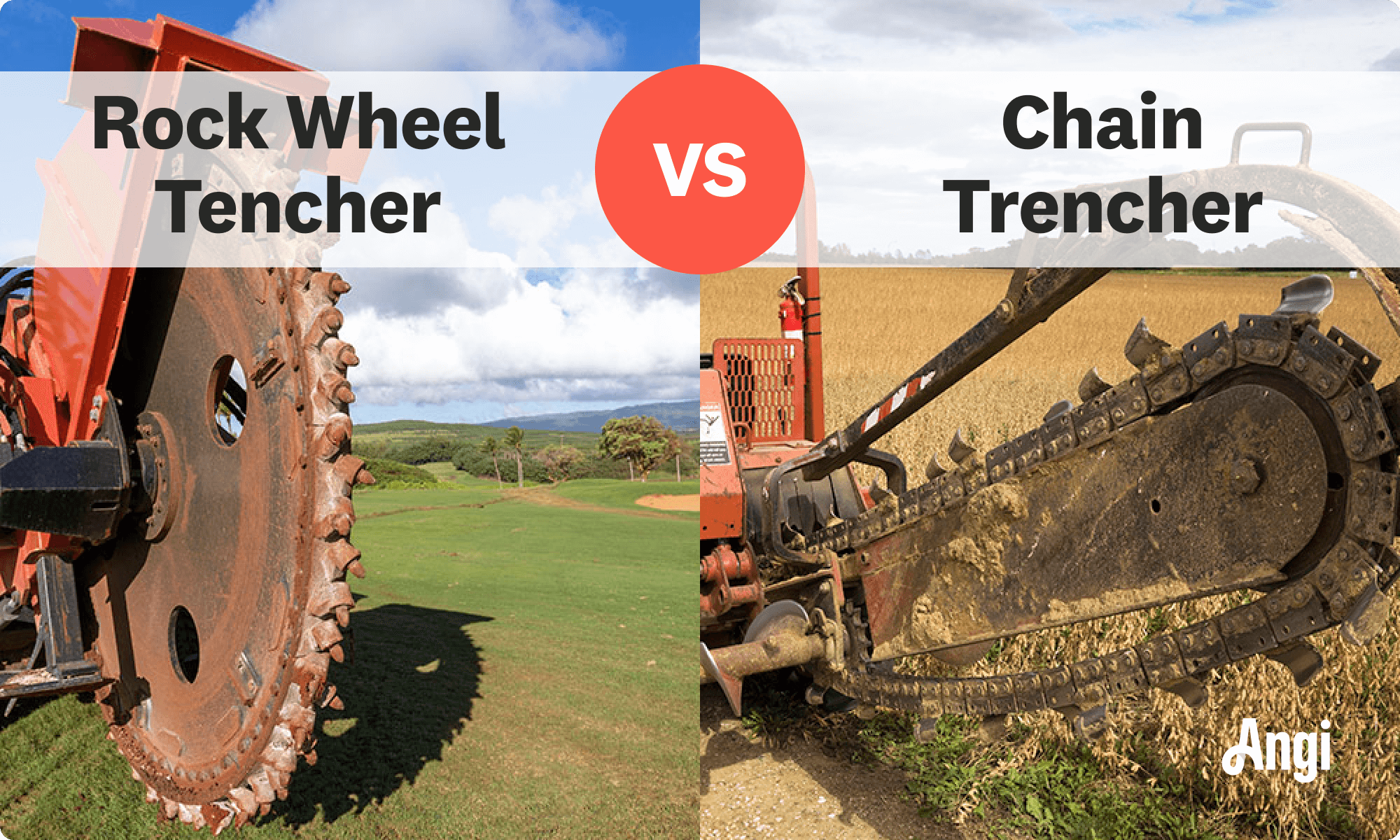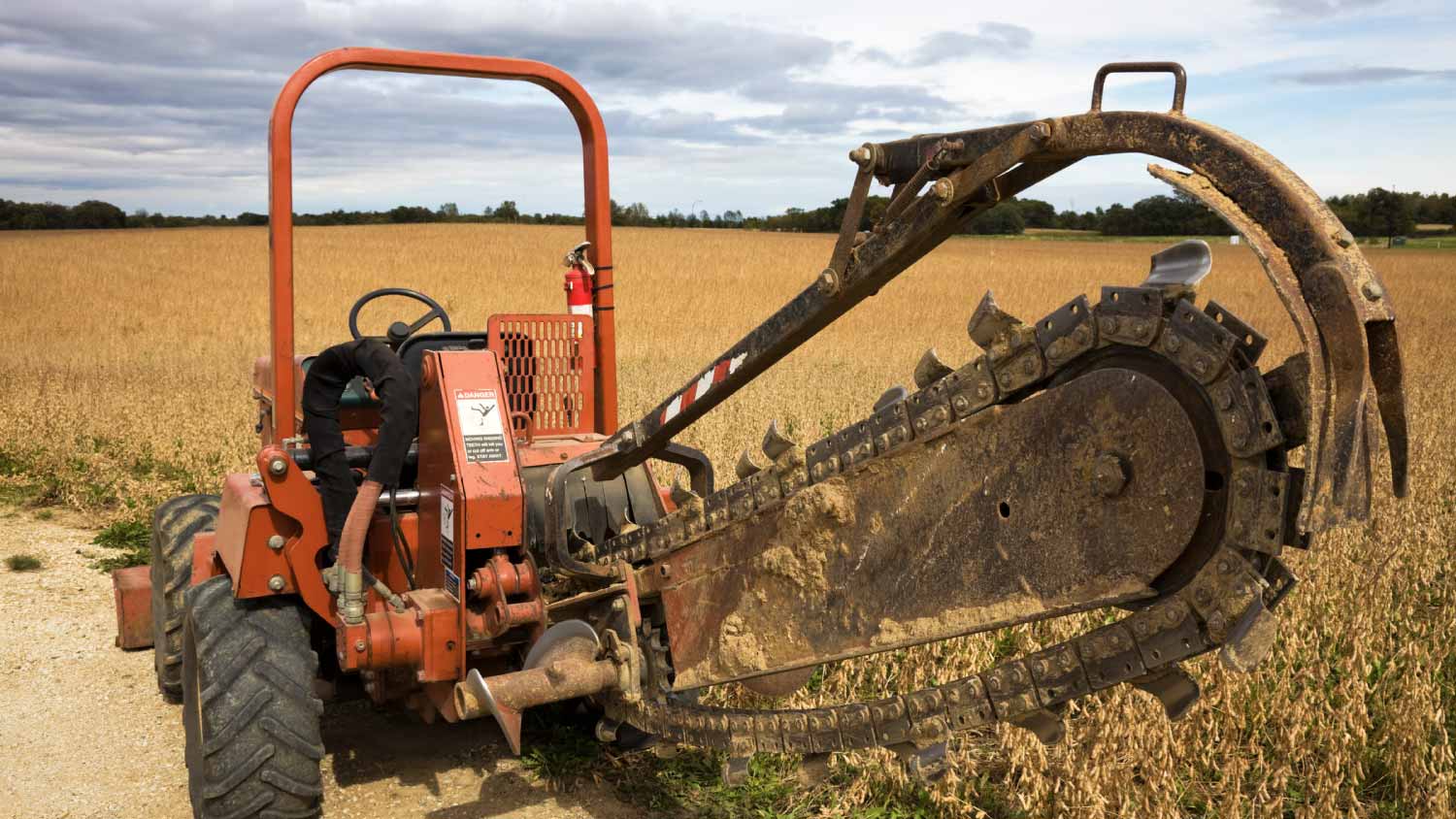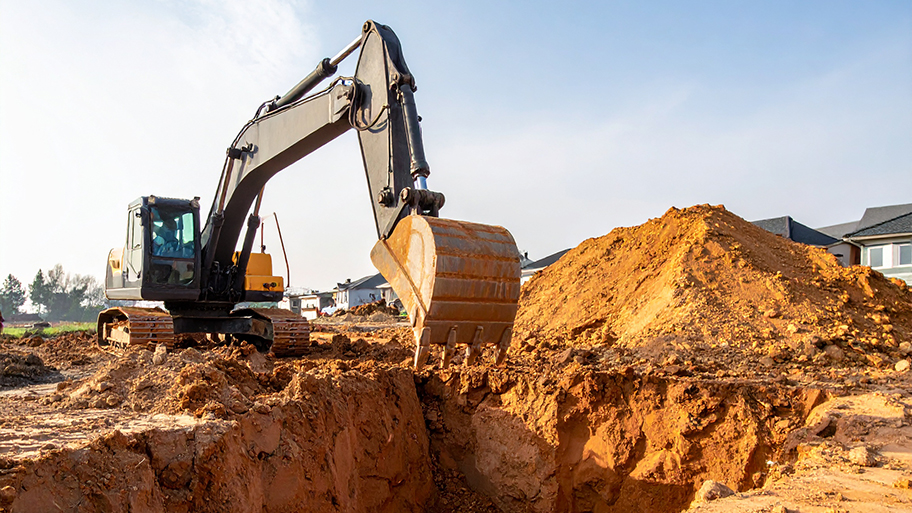
Time to get rid of that old chipped and crumbling walkway? Concrete removal costs can add up, but you have options to simplify the process. Learn more here.
Don’t get caught between a rock and a hard place with the wrong excavation tools


Rock wheel trenchers and chain trenchers are best suited to rocky or difficult terrain.
Use rock, welded shark, or combination shark chains for rocky soil.
On a rock wheel trencher, look for shark or alligator teeth to go through rocks.
Trenching costs $400 to $1,200, including $300 to $400 for equipment rentals.
Trenching is a type of excavation that creates long, narrow divots in the earth, which is great if you need to lay utility lines, install a sprinkler system, or set up yard drainage. But if you have rocky soil or a yard dotted with big rocks, you may be wondering if a trencher can go through rock. Before you decide to just let it rip and find out firsthand, check this guide for tips on handling rocks with trenchers and other excavation equipment.
A trencher can go through smaller rocks if you have the right type of trencher or attachments for the job. Rock wheel trenchers and chain trenchers are designed to cut trenches in tough, rocky terrain and can handle small- to medium-sized rocks in the ground.
But for larger rocks or extremely hard rocks, it’s best to remove them from the trenching path before you start. Otherwise, the rock could blunt the teeth on the wheel or chain, making the trencher less effective at digging through the soil.
If you plan to remove smaller rocks with a trencher, there are several precautions you can take to effectively cut through the rocks while also protecting the trencher.
Soil and rock testing will help you find the right trencher to handle your type of soil, whether it’s rocky, sandy, loamy, or clay. A soil test costs anywhere from $40 to $3,000, depending on what tests you want to run. Paying for a test can ensure you get the right equipment rental rather than paying for one trencher only to find out it’s not right for the job.
If there are medium or large rocks along the path of your planned trench, hire a pro to test the rocks for their hardness levels. A landscaping pro may need to remove the hardest or largest rocks before you can start trenching, but an excavation pro can determine what rocks need to go and which ones a trencher will cut through based on the test results.
There are two main types of trenchers: walk-behind or ride-on trenchers. Walk-behind trenchers are great for smaller jobs, like digging trenches for a sprinkler system. But if you need to cut through tough soil and rock, a ride-on trencher offers more power. Plus, if you’re concerned about how deep a trencher will dig, a ride-on trencher can often dig deeper.

When you’re choosing a trencher for a rocky area, opt for a rock wheel trencher, which has a metal wheel with teeth, or a chain trencher, which has a belt that operates like a chainsaw. Both of these trencher designs can cut through tougher material, meaning you’ll have an easier time trenching through roots or rocks.
Certain chains or teeth work better for rocks or rocky soil. Look for trenchers with any of the following chains or teeth for the best chance of cutting through rocks:
Rock or bullet chain
Welded shark chain
Combination shark chain
Shark tooth
Alligator tooth
If you’re going to be trenching through a rocky area, move the trencher slowly. The rocky ground can cause a lot of bouncing underneath a ride-on trencher, so drive it at a slower pace to keep the machine steady and thoroughly cut through any rocks.

Ride-on rock wheel trenchers and chain trenchers are often powerful enough to cut through many rocks, so some people use them on gravelly landscapes. However, too much rock can also wear down the teeth or chains on a trencher, which will make it less effective for future projects—or cost you damage fees for rental trenching equipment.
A trencher may not be the best tool for digging in an area with a lot of rocks, roots, or other obstacles. Try using a rock saw to break down big rocks before trenching or renting a mini excavator to dig up the rocky landscape with ease. A mini excavator will cost you $150 to $350 per day. Power tools and heavy machinery can be dangerous, though, so consider hiring a professional to help.
Trenching costs $400 to $1,200, whether you rent a trencher and DIY or hire an excavation pro. The rental equipment costs $300 to $500, but you’ll also need to consider permit costs and dirt hauling. Hiring a pro to operate the trencher costs $5 to $6 per linear foot.
If there are rocks in the way of your upcoming trenching job, hire a local excavation company to help. The pros have the proper training to do the job safely, and they won’t send any big rocks flying through your kitchen window, which could happen if you attempt to DIY.
From average costs to expert advice, get all the answers you need to get your job done.

Time to get rid of that old chipped and crumbling walkway? Concrete removal costs can add up, but you have options to simplify the process. Learn more here.

Preparing for a big excavation project in your yard? Find out excavator rental prices by type, project size, and more to budget for your project.

Excavation costs $1,500 to $6,300 for most residential projects—but it depends on factors like the size of the area. This guide will help you plan a budget.

Trenching involves digging long, deep channels, but edging creates shallow, neat borders. Learn more about each method and when to use them.

Who installs trench drains? A local excavation company is best for the job, but a landscaper or plumber can also get it done. Here's how.

When prepping a trench, you may ask, “Will a trencher cut through roots?” Learn how a trencher can effectively complete your excavation project with this guide.